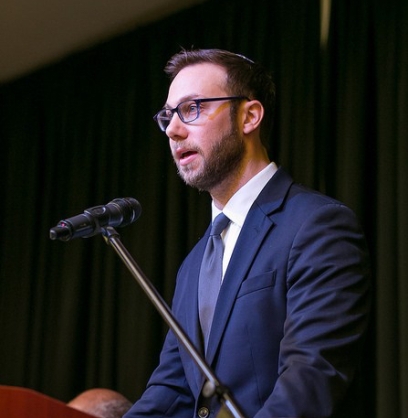The Advice I Would Give New Rabbis
06/26/2017 11:31:09 AM
| Author | |
| Date Added | |
| Automatically create summary | |
| Summary |
…and, for that matter, all young leaders.
 Along with a diverse group of rabbis, I recently completed the Clergy Leadership Incubator (CLI), a two-year fellowship program which trains early-career rabbis in organizational leadership, change management, and institutional transformation.
Along with a diverse group of rabbis, I recently completed the Clergy Leadership Incubator (CLI), a two-year fellowship program which trains early-career rabbis in organizational leadership, change management, and institutional transformation.
For our final retreat (which concluded on June 22, 2017), each fellow was tasked to write the graduation speech we might give if we were invited to speak at our seminary’s ordination exercises. What follows is my “ordination address.”
My fellow rabbis:
At the threshold of Canaan, Moses sends twelve tribal chieftans on a mission to survey the land.
The scouts come back with a unified report: the land is good, its cities are large and well-fortified, and its inhabitants are formidable (Num. 27-29).
Then, one of the scouts, Caleb, interjects a buoyant, if surprising, analysis:
.ויהס כלב את העם אל משה ויאמר עלה נעלה וירשנו אתה כי יכול נוכל לה
Caleb hushed the people before Moses and said, “Let us by all means go up, and we shall gain possession of it, for we shall surely overcome it.”
Caleb’s colleagues are quick to disagree: “We cannot attack that people, for it is stronger than we.” Because the majority opinion follows more naturally from the facts, it sets off a panic among the Israelites. They weep, rebel, and, ultimately, lose everything.
Rabbi Jonathan Sacks, in his collection Lessons in Leadership, argues that the actions of the majority group of scouts amounted to “perhaps the single greatest collective failure of leadership in the Torah…Only Joshua and Caleb among the twelve showed leadership” (pp. 199-200). This view is, of course, typical of the classical commentators. It’s also wrong.
I get why we rabbis identify with and celebrate Caleb. We venerate him for his optimism that, with faith, the odds could be defied. We admire his dynamic vision. We, too, want to stand firmly in the right, even (or maybe, if we’re honest, especially) if we are standing alone. It’s also tempting to condemn the majority group’s pessimism and to judge, with the help of hindsight, their doubt.
But leadership is about more than having insight, vision, confidence, and passion. Leadership is about more than being right. Leadership is about being effective. It’s about mobilizing people to face their challenges. Caleb may have had conviction, but he was no leader.
What would have happened if, instead of rushing to his soapbox, Caleb had taken the time to “step on the balcony” and “take the temperature” of the congregation after the scouts’ report? What would have happened if, instead of leaping unprompted to Moses’ defense, Caleb had paused to identify, enlist, and marshal influential allies, persuade skeptics, and neutralize potential opposition?
Unfortunately, fatefully, we don’t know, because that’s not what Caleb did. The impact was catastrophic.
Emulating Caleb is seductive for us rabbis. As servants of God, lovers of Torah, and pursuers of righteousness, we strive to discern the truth and to stand firm in our convictions. As educated Jewish leaders who are trained to understand communal challenges and to be attentive and faithful to the direction God calls us to take, we try to guide our communities on the right path. These rabbinic roles are crucial. They are often the sources of our authority and the yard sticks by which we measure our own rabbinic worth.
But in my rabbinate I’ve come to learn that the discernment, conviction, and passion we tend to prize as rabbis is meaningless, perhaps even harmful, unless we also know how to be effective.
More than jumping in, effective leadership requires stepping back. More than speaking, effective leadership requires listening and learning. More than taking a stand, effective leadership requires consensus-building and collaboration.
It doesn’t mean compromising our vision, or moderating our passion, or ceding our truth. It doesn’t mean selling out or giving up. Quite the contrary, it is how we affirm our truths, harness our passion, and make our visions reality. It is how we will liberate the enslaved and help our communities serve our Maker.
Indeed, when God charges Moses to redeem Israel, God tells him to first enlist the support of the Israelite elders. Without their partnership, the people could not have been redeemed and set upon their sacred mission.
God offers the same call to us. It is now your turn to lead the congregation of Israel. Whether you make it to the Promised Land is up to you. May you discern where we’re going. And may you grow to be the leader who takes us there.
Mazal tov.
Wed, November 27 2024
26 Cheshvan 5785
Upcoming Events
-
Thursday ,
NovNovember 28 , 2024Temple offices closed
Thursday, Nov 28th (All day)
-
Friday ,
NovNovember 29 , 2024Temple offices closed
Friday, Nov 29th (All day)
-
Tuesday ,
DecDecember 3 , 2024Introduction to Judaism
Tuesday, Dec 3rd 6:15p to 9:15p
-
Tuesday ,
DecDecember 10 , 2024Introduction to Judaism
Tuesday, Dec 10th 6:15p to 9:15p
-
Tuesday ,
DecDecember 17 , 2024Introduction to Judaism
Tuesday, Dec 17th 6:15p to 9:15p
-
Wednesday ,
DecDecember 25 , 2024Temple offices closed
Wednesday, Dec 25th (All day)
-
Wednesday ,
JanJanuary 1 , 2025Temple offices closed
Wednesday, Jan 1st (All day)
-
Saturday ,
JanJanuary 4 , 2025Kiddush Sponsored by Ari and Meggie Hirsch
Shabbat, Jan 4th 12:00p to 1:30p
in honor of all our B'nai Mitzvah Tutors -
Tuesday ,
JanJanuary 7 , 2025Introduction to Judaism
Tuesday, Jan 7th 6:15p to 9:15p
-
Tuesday ,
JanJanuary 21 , 2025Introduction to Judaism
Tuesday, Jan 21st 6:15p to 9:15p
subscribe
|
Temple Beth-El 3330 Grove Ave. Phone 804-355-3564
Jacob & Selma Brown Religious School 601 N. Parham Rd
|
|||
| Temple Beth-El
|
|||
Privacy Settings | Privacy Policy | Member Terms
©2024 All rights reserved. Find out more about ShulCloud



